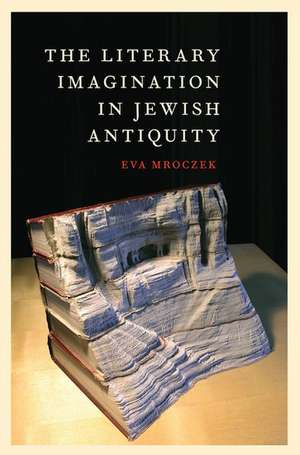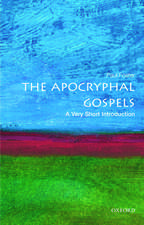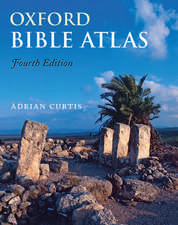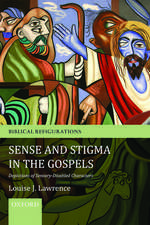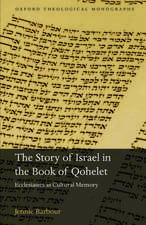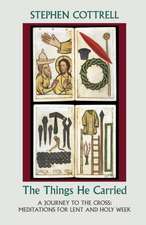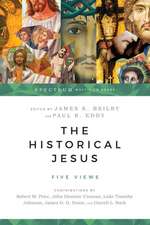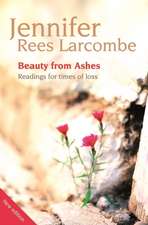The Literary Imagination in Jewish Antiquity
Autor Eva Mroczeken Limba Engleză Paperback – 26 apr 2018
| Toate formatele și edițiile | Preț | Express |
|---|---|---|
| Paperback (1) | 256.55 lei 31-37 zile | |
| Oxford University Press – 26 apr 2018 | 256.55 lei 31-37 zile | |
| Hardback (1) | 816.17 lei 31-37 zile | |
| Oxford University Press – 16 iun 2016 | 816.17 lei 31-37 zile |
Preț: 256.55 lei
Preț vechi: 318.92 lei
-20% Nou
Puncte Express: 385
Preț estimativ în valută:
49.10€ • 53.31$ • 41.24£
49.10€ • 53.31$ • 41.24£
Carte tipărită la comandă
Livrare economică 12-18 aprilie
Preluare comenzi: 021 569.72.76
Specificații
ISBN-13: 9780190886080
ISBN-10: 0190886080
Pagini: 284
Ilustrații: 4 illus.
Dimensiuni: 155 x 231 x 20 mm
Greutate: 0.41 kg
Editura: Oxford University Press
Colecția OUP USA
Locul publicării:New York, United States
ISBN-10: 0190886080
Pagini: 284
Ilustrații: 4 illus.
Dimensiuni: 155 x 231 x 20 mm
Greutate: 0.41 kg
Editura: Oxford University Press
Colecția OUP USA
Locul publicării:New York, United States
Notă biografică
Eva Mroczek is Assistant Professor of Religious Studies at the University of California, Davis. She holds a PhD in the Study of Religion from the University of Toronto.
Recenzii
Mroczek's argument is innovative, cogent, and commendable as a corrective to situate scholars' historical perspective.
Mroczek is a sage guide, and I am open to following her into a brave new world with neither Bibles nor books, but I want to hear more from her about these peculiarly Jewish textual practices. Luckily for us all, this is only Mroczek's first book.
The book is breathtaking and beautifully-written, taking issue with the notion of both 'the Bible' and 'the book'. Stripping away scholarly assumptions about early Jewish literary culture, this study tackles the scraps, fragments and scrolls that have, over the centuries, been imaginatively ordered often, as Mroczek shows, erroneously into a coherent canon. The Literary Imagination in Jewish Antiquity asks readers to explore the literature of early Judaism on its own terms, and, in doing so, prompts us to rethink dominant paradigms which structure our imaginative approach to biblical literature and textual circulation. Despite its impressive and wide-ranging scholarship, the book is deft of touch, enjoyable and accessible, and should be read by any scholar interested in the history of the Bible, early Jewish literature, and the idea of the book.
'Biblical' primacy is a mirage that continues to mislead scholars in their quest to recover the scriptural roots of both Judaism and Christianity. The Literary Imagination in Jewish Antiquity promises to remake the ways in which scholars think about and talk about the role of Bible in early Jewish and Christian communities. The book is perhaps the most important publication on 'how the Bible came to be' to date.
Religious communities today often take for granted that in ancient times the 'Bible' consisted of an exclusive pool of textually inflexibleand therefore divinely inspiredwritings. Mroczek's study beautifully demonstrates how anachronistic this assumption is. At the same time this book recovers for us a religious world that did not require a fixed objectifiable text or collection of texts in order for discourse about the sacred in writing and memory to be meaningful and, indeed, transformative. This constructive approach to Second Temple Judaism is a must-read!
The discovery of the Dead Sea Scrolls overturned longstanding assumptions about the formation of biblical books and canons. Moving beyond this much-repeated insight, Eva Mroczek invites the reader to rethink what 'books' and 'literature' did and meant for ancient Jewsin and beyond the Bible. The result is a brilliant study bristling with astonishingly fresh insights, challenging questions, and creative new approaches, opening up exciting conversations at the crossroads of Biblical Studies, Jewish Studies, and Book History.
Mroczek is a sage guide, and I am open to following her into a brave new world with neither Bibles nor books, but I want to hear more from her about these peculiarly Jewish textual practices. Luckily for us all, this is only Mroczek's first book.
The book is breathtaking and beautifully-written, taking issue with the notion of both 'the Bible' and 'the book'. Stripping away scholarly assumptions about early Jewish literary culture, this study tackles the scraps, fragments and scrolls that have, over the centuries, been imaginatively ordered often, as Mroczek shows, erroneously into a coherent canon. The Literary Imagination in Jewish Antiquity asks readers to explore the literature of early Judaism on its own terms, and, in doing so, prompts us to rethink dominant paradigms which structure our imaginative approach to biblical literature and textual circulation. Despite its impressive and wide-ranging scholarship, the book is deft of touch, enjoyable and accessible, and should be read by any scholar interested in the history of the Bible, early Jewish literature, and the idea of the book.
'Biblical' primacy is a mirage that continues to mislead scholars in their quest to recover the scriptural roots of both Judaism and Christianity. The Literary Imagination in Jewish Antiquity promises to remake the ways in which scholars think about and talk about the role of Bible in early Jewish and Christian communities. The book is perhaps the most important publication on 'how the Bible came to be' to date.
Religious communities today often take for granted that in ancient times the 'Bible' consisted of an exclusive pool of textually inflexibleand therefore divinely inspiredwritings. Mroczek's study beautifully demonstrates how anachronistic this assumption is. At the same time this book recovers for us a religious world that did not require a fixed objectifiable text or collection of texts in order for discourse about the sacred in writing and memory to be meaningful and, indeed, transformative. This constructive approach to Second Temple Judaism is a must-read!
The discovery of the Dead Sea Scrolls overturned longstanding assumptions about the formation of biblical books and canons. Moving beyond this much-repeated insight, Eva Mroczek invites the reader to rethink what 'books' and 'literature' did and meant for ancient Jewsin and beyond the Bible. The result is a brilliant study bristling with astonishingly fresh insights, challenging questions, and creative new approaches, opening up exciting conversations at the crossroads of Biblical Studies, Jewish Studies, and Book History.
